China Adoption Disruption Part 2
The China Adoption Disruption blog post series was originally written in 2013. I wrote it to start conversations about something that people are (understandably) hesitant to speak openly about. To date, this is one of the most-read posts on this blog. If you find yourself considering adoption disruption, I hope you find someone to talk to about it and that you find the very best solution for your family.
So, why does disruption happen? Is it happening more frequently? That’s a hard question to answer since accurate stats aren’t recorded.
What makes a family that has waited for a child, spent thousands of dollars and endured a mountain of paperwork say “no” and hand a child back? Are they bad people?
People might get on the plane to China with unrealistic expectations but I’d hope no one gets on the plane with the expectation they won’t come home with their child.
“China Lied”
Some people blame inaccurate information in the child’s file for disruption. I’ve heard “China lied” a bazillion times. Adoption files contain inaccuracies – ours sure as hell did.
[Tweet “Adoption files contain inaccuracies. Ours sure as hell did. #adoption, #disruption”]
Families need to be educated to be ready for inaccuracy, inconsistency and straight up lies when it comes to what’s expected versus the child they will meet. If agencies and social workers aren’t preparing us better for this then shit needs to change. Agencies need to do better. We need to push for more thorough, better info.
For us, I’m not sure if I’d go with “China lied.” I think China left some stuff out. Maybe facts were lost in translation. Maybe the doctor was in a hurry that day. Maybe someone cut and pasted.
I don’t agree with in-China disruptions but boy do I understand the “oh shit” moment when you’re tired, emotional, jet-lagged, stressed out, scared and far from home and what is familiar trying to deal with a child that wasn’t what you expected.
If you believe you’re adopting a child with a club foot you shouldn’t expect to be given a child with club foot and cerebral palsy. Aside from this, families need to expect worst case scenario for the medical need they were aware of when submitting intent to adopt that child.
Adoptive families need to be familiar with the worst case scenario. If someone doesn’t hand that information to you on a platter, find it. Do your homework. Don’t stick your head in the sand and tell yourself “love conquers all,” because that’s bullshit.
[Tweet “Don't stick your head in the sand and say “love conquers all” because that's BS. #adoption”]
The first time I heard about disruption was when a parent in one of my adoption Facebook groups reported having to make the hard decision to leave their child in China and come back without to the United States without her. The parents were painted a picture of a child who was cognitively on track who attended school. Reportedly, the child they were handed was a six-year-old who was developmentally 18 months-old. She didn’t talk. She wore diapers.
This family got some additional medical evaluation in China and were told “this is as good as it gets.” They chose not to adopt her and came home. They later returned to China and adopted another child.
I was shocked to learn stuff like that happened. Nothing in my parent education had prepared me that. I tried to put myself in their shoes and wondered what kind of decision I’d make in their place. I couldn’t come up with an answer.
Some say there are no guarantees in parenting. Some say special needs adoption is different and that a family does and should get a say-so in what type of medical needs they can handle. I straddle the fence on that one. There’s no “exchange policy” with our biological kids. Parenting is full of unknowns.
What’s the right answer? Is there one?
I’ve heard virtual whispers about disruptions and dissolutions. It happens. We all know it but we don’t talk about it. Making mention of disruption is viewed as being “mean” and “unsupportive.”
Talking about the ugly side of adoption potentially scares families off which might result in a decrease in adoptions. Families who are still in the process of adopting don’t speak up for fear that their own adoptions will be affected.
The fear of scaring someone off shouldn’t deter us from telling the truth even when the truth is ugly. Especially when it is ugly.
Disruption is shrouded in silence. If I found myself in that situation, would I want to give an interview? Hell no.
However. There are these situations:
- Family decided their newly adopted ten year-old daughter “wasn’t a good fit” based on her behavior in China. They brought her to the United Sates so that she wouldn’t have to go back to the orphanage and “re-homed” her within days of coming home. They later pursued another adoption of another older girl from China.
- Family decided they “didn’t feel bonded” to their toddler after eight months and gave her up. It just wasn’t “working out.” The child was adopted by another family through a “second chance” adoption.
- Family was upset that a two year old with known developmental delays wasn’t walking steadily upon first meeting and said “no” almost instantly. She shouted at the orphanage workers and demanded another child.
- Family decided that the child who wouldn’t make eye contact or interact with them during the first twenty-four hours was autistic and handed her back the day after they met her.
- Family upon meeting their child with a cleft palate made the snap diagnosis (parents weren’t medical professionals) that the child “must have” cerebral palsy because she was wobbly and had poor muscle tone.
After endless paperwork, scrutiny, waiting and expense, these families flipped the script in a short span of time with limited information and no professional intervention. It’s hard not to judge.
Why does this happen?
Are we trying to make the special needs adoption program fit into some preconceived mold and take the place of the non-special needs adoption program? Yes, I mean the program where you wait seven plus years for a healthy, very young baby girl. Many parents who were in the non-special needs line are flocking now to Waiting Child. Because let’s face it – most families pursuing adoption are going to be turned off by a seven year wait. Who wouldn’t be?
There are a lot of families who are trying to adopt non-special needs kids through the special needs program. Cleft lip? Port wine stains? Eczema? Older child adoption? These are the kinds of things that will land a child on the special needs list in China. We tell ourselves these things are “no big deal.” If I had a nickel for every family out there who has said “how hard could it be” I’d be slurping champagne in Aruba right now.
If you’re a parent out there thinking of adopting a child with a “practically nothing” medical issue, please do your homework.
Minor is in the eye of the beholder. There are a shit ton of families raising their hands to parent kids with complex conditions without fully understanding what that condition entails. These families let a picture of an adorable face and sad eyes make the decision.
“Worst case? Whatevs. Love conquers all.”
Bullshit.
There are plenty of families who tackle international adoption with eyes wide open but there are plenty of families who follow their heart and take an uneducated leap of faith. These families are in a prime position for adoption failure.
Medical worst-case scenarios, difficulty in bonding and attaching and adoption termination are not openly discussed amongst potential adoptive parents.
The China community has built “safe haven” communities restricted to post adoptive parents where we can say things that won’t scare off the parents who are still in the process. We gain admittance to closed Facebook groups once we’ve migrated to “the other side” and are shell shocked and scared shitless. Welcome to the discussion boards of hell where we couldn’t tell you the shit you were in for before it was too late to back out.
Best case scenario? Developmental delays, orphanage behavior, malnutrition and parasites. Bonding (in either direction) may be instant or may be a struggle. A parent may feel that “something is wrong” because they don’t feel love for the child right off the bat, or even during the first few months.
You might not even like the child. They might be scared and acting out. They might be testing you. They might be limp, lethargic and shut down, causing a scared parent’s imagination to jump to severe delays, cerebral palsy, or brain damage. And by the way, Dr. Google and “Web MD” are going to validate what you think you’re looking for and probably aren’t going to provide good direction when you’re doing a stressed out internet search at two in the morning in China because you’re having second thoughts about the kid you were just handed.
[Tweet “Two weeks in China doesn't give you an accurate look in to what a child is really like #adoption”]
Two weeks in China doesn’t give you an accurate look in to what a child is really like. Barring truly exceptional circumstances, give your child a chance. Let them blossom and recover from the extreme shock and trauma that adoption day might bring. Talk to your adoption agency and your social worker. Let them talk you through options. The choice to disrupt in China is to make a forever decision for your family and that child who has waited for you in a very short span of time under stressful circumstances.
There are limited stats on adoption disruptions. No one likes to talk about it.
If there is a lack of education and awareness on one end, there is probably a lack of compassion and care for the family on the other end that makes most – not all but most – unwilling to come forward with their “why story.”
Why isn't China adoption disruption something we talk openly about?
This is a three part series on China Adoption Disruption. You are reading Part Two.
PART ONE PART THREE
If you're interested in reading a variety of perspectives on adoption, check out the #AdoptionTalk Linkup every first and third Thursday right here.
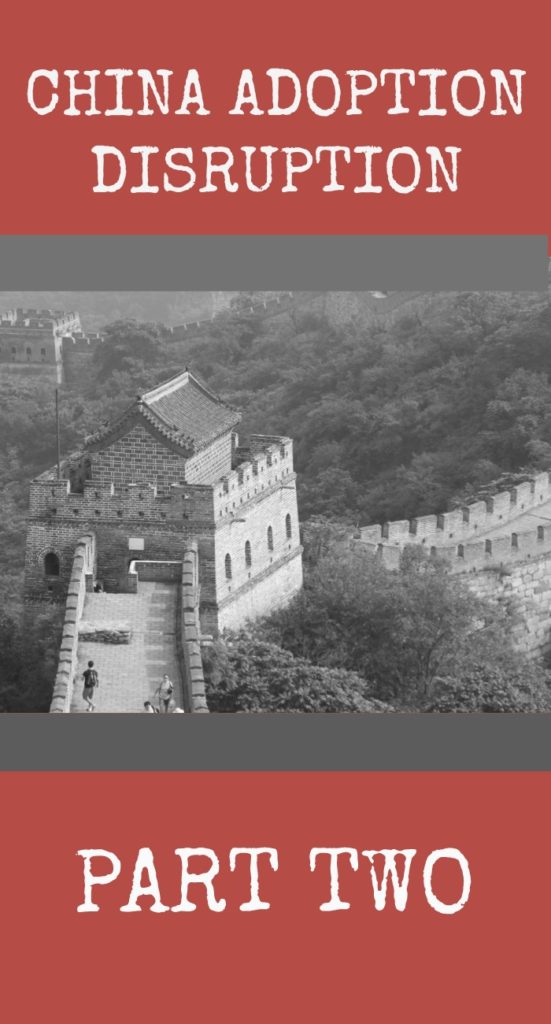
Thank you for being here, friends.

Follow Ripped Jeans and Bifocals's board Adoption Talk Linkup on Pinterest.


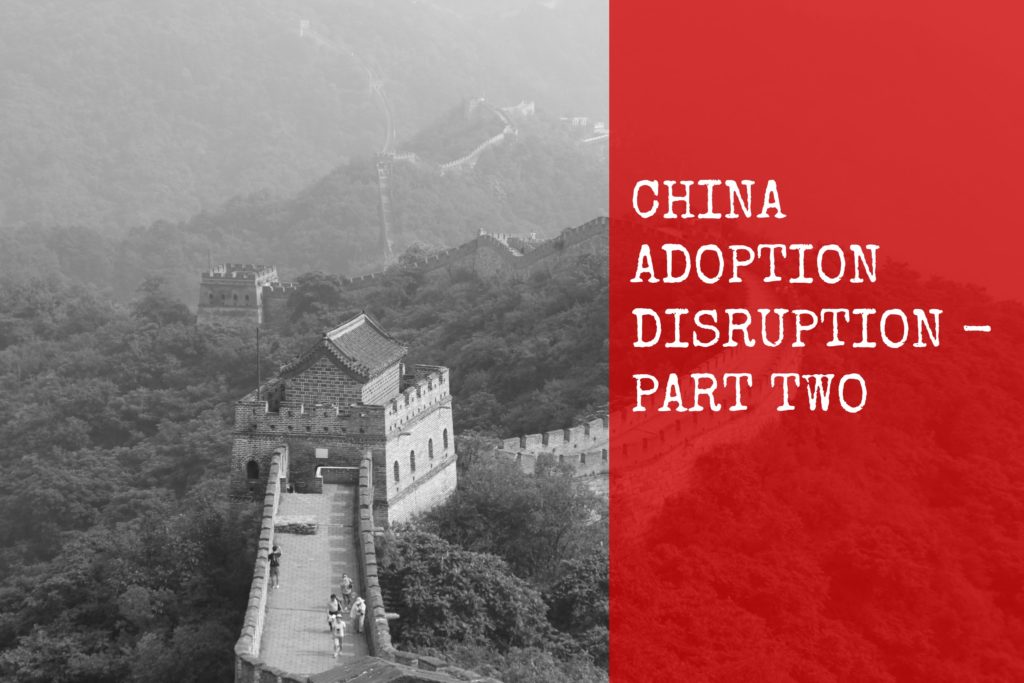
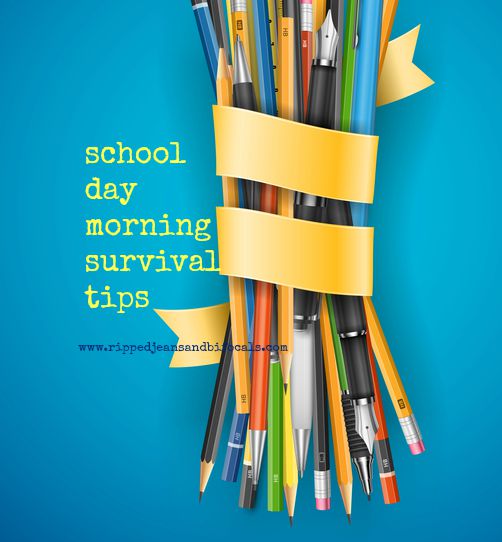

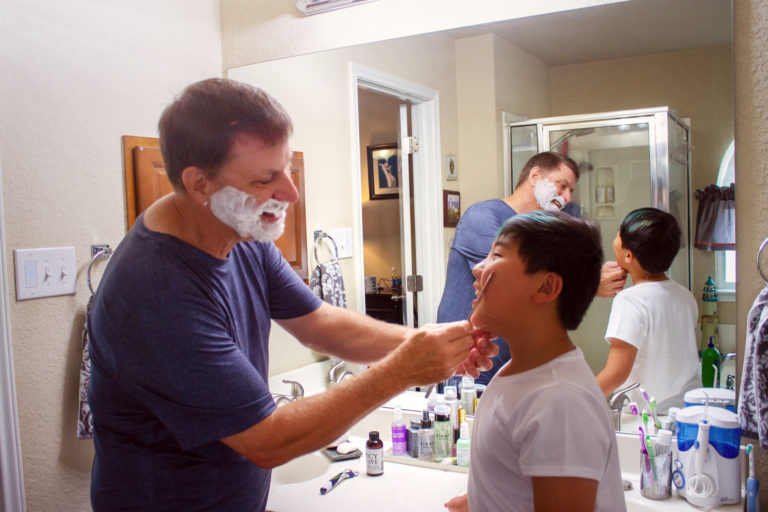

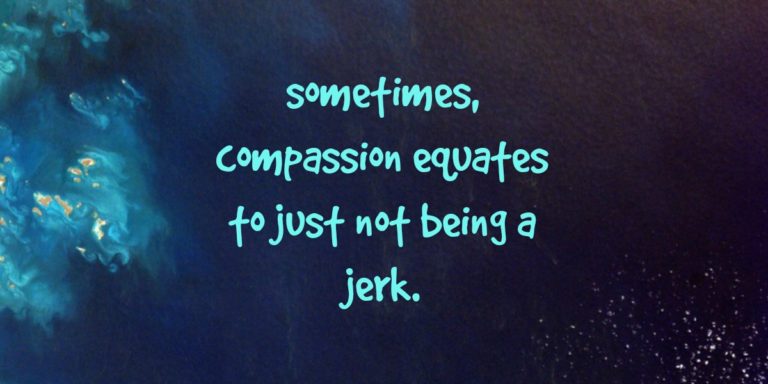
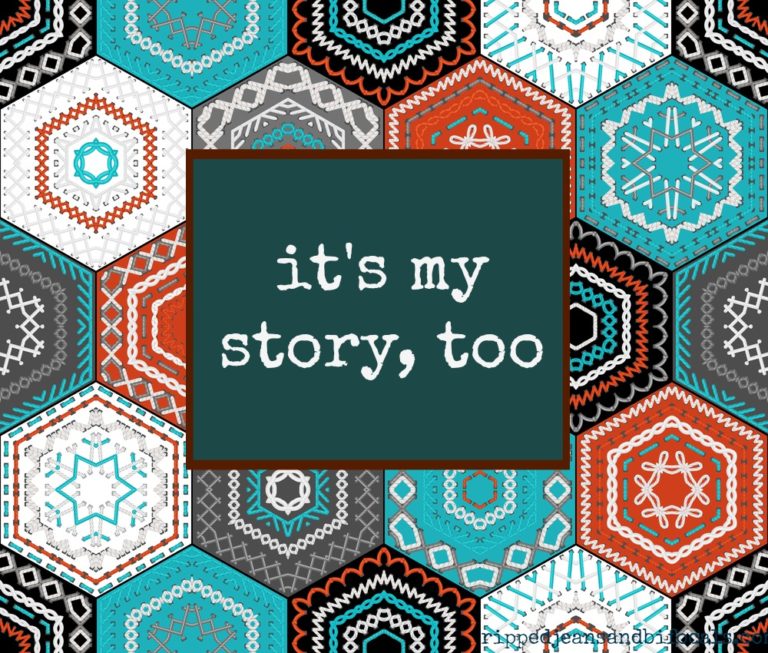
There is no such thing as “instant bonding” When you birth a baby you are building a bond over 9 months….and it continues. Nothing makes me cringe more when I read AP’s stating “she bonded instantly with wife xyz” Your baby is scared to death and is in survival mode. Trust and attachment takes time—if you go in with that expectation you will be better off.
Thank you for your thoughtful sensitive essay. As a family who disrupted in China (we went through non special needs, waiting four years), I want to add it is not an easy process. Nobody, not your agency or anyone in China, will simply allow a family to refuse a child. We had to consult with pediatrician’s both in the US (by phone) and in China. We had to have an independent physician in China concur diagnosis with US physician.
We had very limited time to do this. Everyone knew the weight of our decision. It was so hard but in the end all knew we made the right decision for our family based on accurate information from two expert sources.